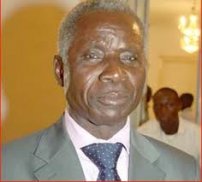Let's examine Nunoo Mensah’s comments carefully, says Pelpuo
 A Minister of State at the Presidency, Alhaji Abdul Rashid Pelpuo, has called on Ghanaians to critically examine the recent comments by the National Security Advisor, Brigadier-General Joseph Nunoo-Mensah, on workers demands instead of condemning him since he raised fundamental issues on the economy.
A Minister of State at the Presidency, Alhaji Abdul Rashid Pelpuo, has called on Ghanaians to critically examine the recent comments by the National Security Advisor, Brigadier-General Joseph Nunoo-Mensah, on workers demands instead of condemning him since he raised fundamental issues on the economy.
“We should look at the issues rather than the personality because the heightened demands by workers for salary increases, payment of arrears and other demands have direct consequences on the national economy”, Alhaji Pelpuo suggested.
Speaking to the Daily Graphic, Alhaji Pelpuo, who is also the Member of Parliament for Wa Central, said he believed that Brigadier Nunoo-Mensah had raised issues which called for critical thinking and national debate.
“We have to debate it because of the huge implications of the demands on the economy and the fact that the economy must be there before we make demands”.
At the inauguration of a school block at the O’reilly Senior High School recently, Brigadier-General Nunoo-Mensah (retd) chastised the various government workers unions in the country for their continuous demands for salary increases and better conditions of service and advised those who could not cope with the current situation to get out of the country.
His comments attracted criticisms from government workers, unions and political parties, particularly the New Patriotic Party (NPP), which he accused of being behind the current workers’ agitations.
But Alhaji Pelpuo cautioned that the current economy could not contain the continuous demands by workers.
“We should have an economy that has the capacity to accommodate the expenditure needs of the country, including workers’ demands”, he said.
He explained that even though the economy expanded more than 100 per cent between 2009 and 2013, formal workers’ salary alone took more than 70 per cent of the country’s budget estimates.
Alhaji Pelpuo stated that of the GH¢14 billion the budget covered in 2013, workers salaries was estimated to cover GH¢8.5 billion, and explained that by the first quarter of 2013, the wage bill increased to GH¢9.2 billion.
“It is estimated that the wage bill will increase to GH¢11 billion by the end of the year”, he said, adding that Ghanaian workers should co-operate with the government to find a lasting solution to the ever-increasing wage bill.
“If this matter has been brought to the fore, we need to confront the reality and workers must be at the forefront to find solutions and not to agitate and give deadlines. In the debate that has been sparked by Brigadier Nunoo-Mensah, we must differentiate the problem from the personality”.
Alhaji Pelpuo said in the last budget, subsidies on fuel, water and electricity exceeded GH¢2 billion. He, therefore, called for measures to tackle the problem head-on.
The questions that we should pose and find answers to include the following: “Should we continue to expand the payroll? Should we continue to subsidise the utilities and incur huge debts? Should we not begin to look at a novel way of generating more income?” and “Should workers become part of the creativity in redefining the way forward rather than the current agitations?”
“I believe that we have to begin to appreciate the concern being raised from all quarters,” he said, and appealed to workers to co-operate in the efforts to build an economy that could sustain the demands.
He asked workers and the entire Ghanaian population to see the debate being called for as crucial, adding “ we should do so devoid of political interest and place the interest of Ghana first”.
By Emmanuel Adu-Gyamerah/Daily Graphic/Ghana
